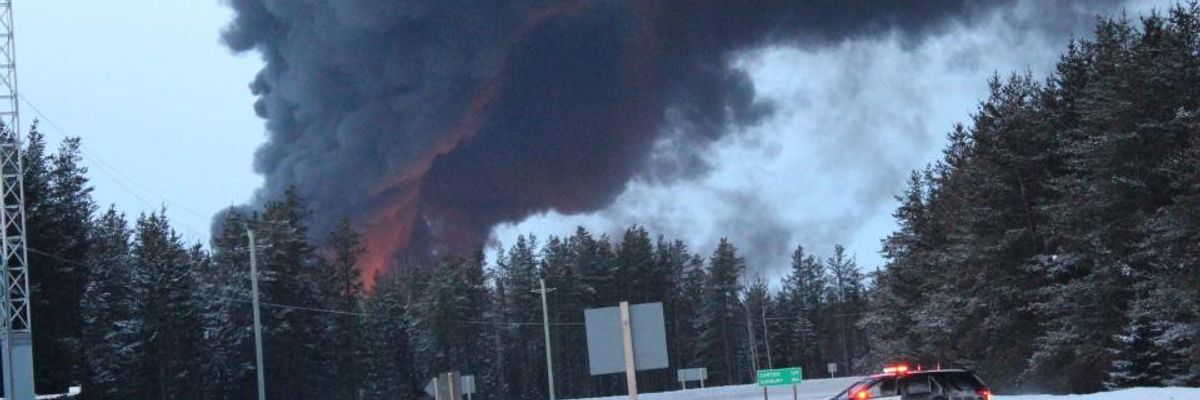A train carrying crude oil that derailed in northern Ontario on Saturday--which resulted in numerous overturned cars catching fire and oil spilling into a local waterway-- is the fourth such accident in North America in as many weeks.
The train, owned by the Canadian National Railway Co., was passing over a bridge above the Makami River near the town of Gogama, Ontario when the derailment occurred, sending thirty-five cars off the tracks, at least five of which ended up in the water. A large fire and huge black clouds of smoke followed.
"The oil and railroad industries are playing Russian roulette with people's lives and our environment, and the Obama administration needs to put a stop to it." --Mollie Matteson, Center for Biological DiversityThe CBC reports the train was 94 cars long and all were tanker cars carrying crude oil from Alberta.
Officials with rail company have said their disaster response team was on the scene and tried to assure residents that drinking water supplies have not been harmed. Local residents who spoke to media did not seem convinced there was nothing to worry about.
"It's frightening and nerve-wracking, especially after what happened in Quebec," Roxanne Veronneau, owner of the Gogama Village Inn, told the Toronto Star, referring to the train derailment in Lac-Megantic in 2013 that killed 47 people.
"People here are on pins and needles," Veronneau continued. "The tracks run right through town ... I'm sure that there's going to be a lot of talk afterward that this shouldn't be in the middle of our town."
Since February 14, there have been three other fiery oil train derailments in North America, including another in Ontario and two in the U.S., one in West Virginia on February 16 and the other last Thursday in Illinois.
Speaking on behalf of the Center for Biological Diversity, senior scientist Mollie Matteson said the rate of derailments speaks to a crisis that demands immediate and aggressive action.
"Before one more derailment, fire, oil spill and one more life lost, we need a moratorium on oil trains and we need it now," said Matteson in a weekend statement. "The oil and railroad industries are playing Russian roulette with people's lives and our environment, and the Obama administration needs to put a stop to it."
As with at least three of the four latest rerailments, the cars involved in Saturday's crash were all confirmed by a company spokesperson to be the supposedly safer, newer model--known as CPC-1232--which Canada's transportation administration recently ordered to be a requirement for all new tank cars constructed to carry flammable liquids.
As the Star reports:
Compared with the previous "legacy" Class 111 tank cars, which were involved in the Lac-Megantic disaster, those built to the CPC-1232 standard have enhancements including half-head shields, improved top and bottom fitting protection and normalized steel, according to the Transportation Safety Board of Canada, which is investigating the latest Gogama derailment.
However, the TSB has sounded the alarm that the new CPC-1232 standard is still not enough to prevent ruptures and oil spills during derailments.
Another CN train derailment near Gogama on Feb. 14 involved tank cars built in the last three years to the new standard. No injuries were reported, but the derailment and subsequent oil spill caused fires that took almost a week to extinguish.
According to CBC:
Gogama residents spent much of the weekend looking up at the large plume of black smoke looming over the town.
Dawn Simoneau, 33, said her two daughters have been asking questions about the derailment.
"Like, 'Are the fish going to be okay?' and they are concerned as well," said Simoneau, a life-long Gogama resident, has lived her entire life with trains rumbling past and an ever-present fear that something might happen.
"This is just always the way it's been. And now ... we're thinking, 'What can we do now to make sure this doesn't happen again?'"
Meanwhile on Sunday, fires were still reportedly burning in Illinois after the train derailment that happened near the Mississipppi River on Thursday continued to threaten further environmental damage.

